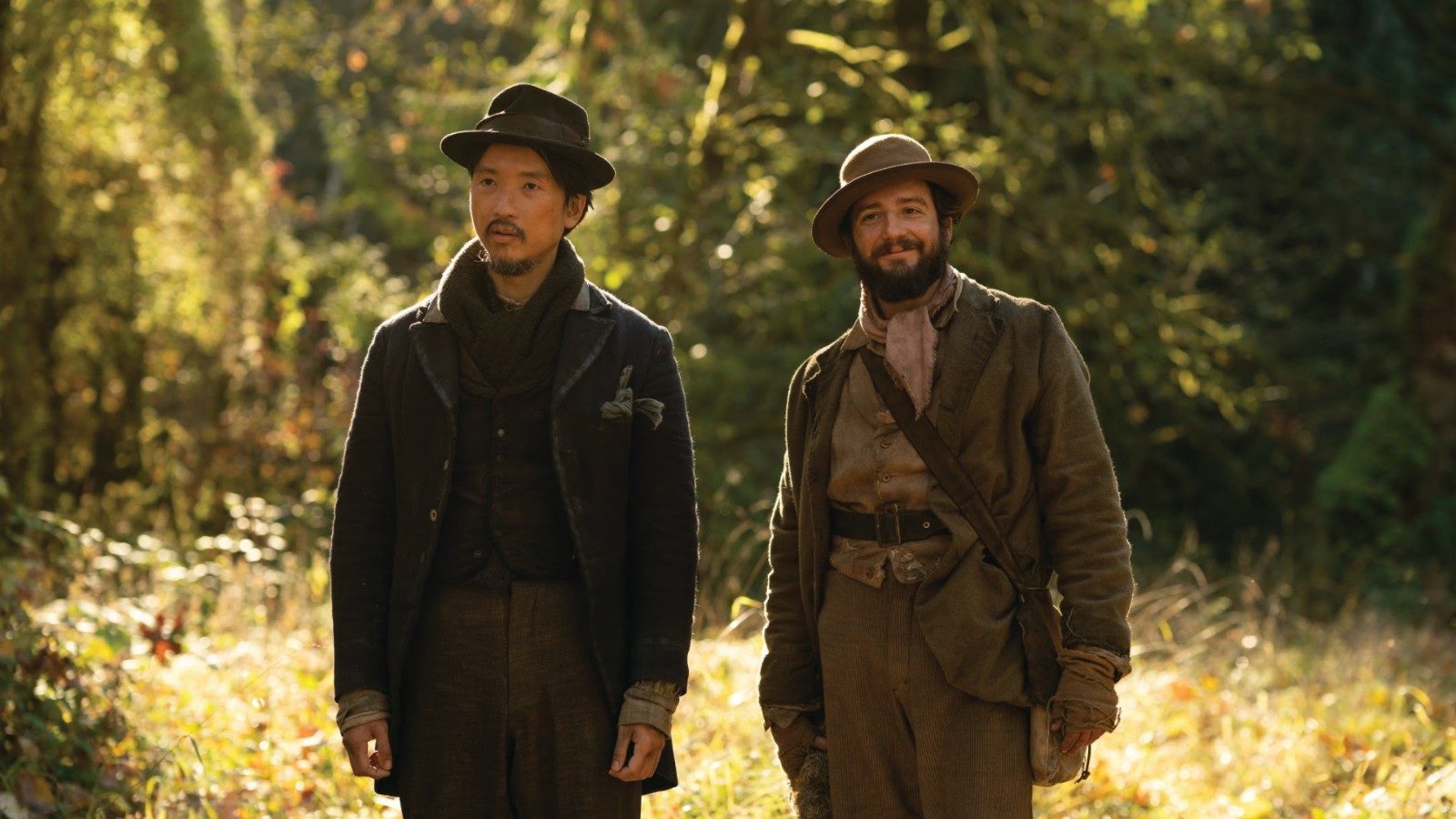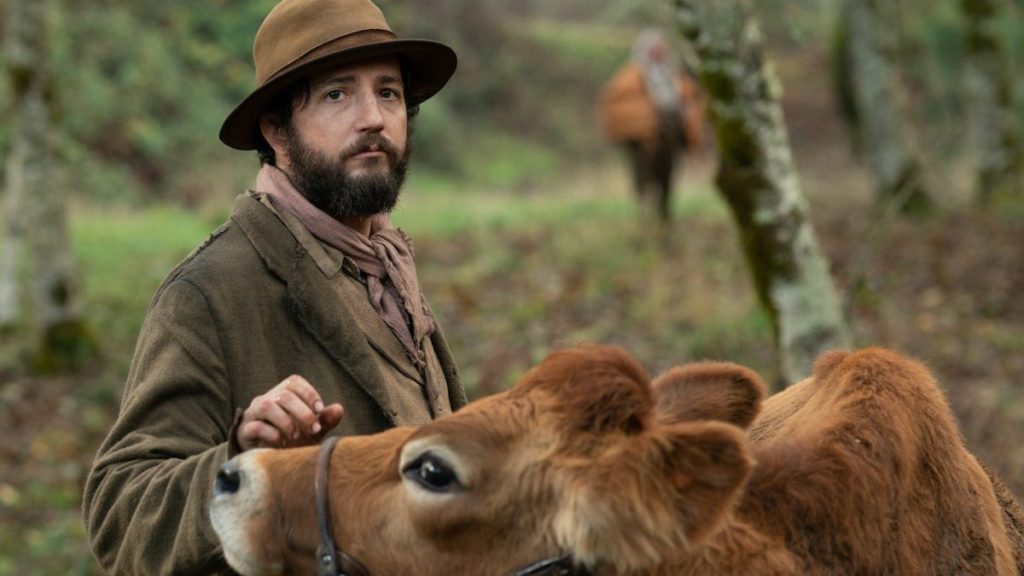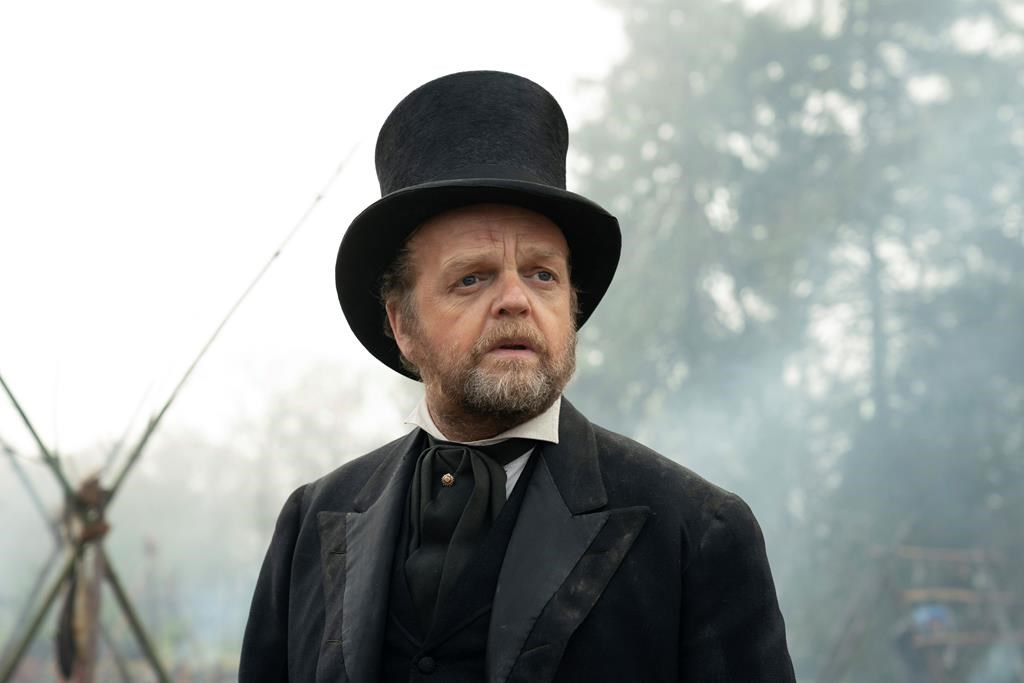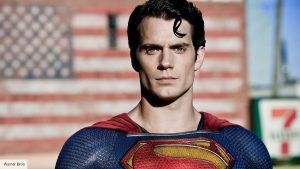
Classic Western films tend to conjure a specific set of images. Laconic gunslingers with lethal aim, dusty planes stirred by an ominous breeze, Boomtowns with their creaky saloons. Many Westerns exist in their own universe, a romanticized fable, a version of America that never really existed. While First Cow takes place in the American Old West, it bears little resemblance to the traditional Western. Replacing the gruff cadence of its forebears with a decidedly more gentle and contemplative bearing, we are treated to a quiet film that feels firmly rooted in the humdrum rhythm of frontier life. This deliberate pacing lets us grow closer to our two protagonists, emphasizing their burgeoning friendship. When this state of calm is inevitably replaced by escalating stakes and danger, the loss of peace is all the more devastating.
The story follows two frontiersmen who meet by chance in the forests of Oregon territory. Otis Figowitz, or Cookie, is a cook working with a crew of brutish fur trappers. While foraging for mushrooms Cookie comes across a man, crouching naked in the brush. He is King Lu, a Chinese immigrant on the run from Russians after a deadly altercation. After Cookie helps him, the two eventually meet up at Fort Tillicum, where they strike up a friendship and begin to share their aspirations. Cookie admits that he wants to either start a bakery or a hotel in San Francisco. It’s then that Lu comes up with an idea. What if they start baking then and there? Since the fort’s inhabitants don’t have access to baked goods, they can potentially make a small fortune. Chief Factor, a rich Englishman who lives nearby, recently had a cow shipped to the territory, providing the essential ingredient for their enterprise, milk. With this, the two decide to “borrow” some of the cow’s goods, so that they can cobble together enough money to follow their dreams and leave the frontier life behind.

However, I have omitted an important detail. The opening sequence of the film takes place in the present day, as a girl stumbles upon a grisly sight. Her dog uncovers bones, human bones. As the girl digs out the grave, she finds two skeletons. This image hangs over everything that follows, a portent that infuses events with a sense of grim inevitability. This ominous backdrop makes the formation of the central friendship all the more bittersweet. Much of the film cleverly plays with this sense of dramatic irony, methodically building tension as things spiral into disaster.
In many ways, the companionship between Cookie and Lu is the backbone of this story. While relatively subdued, their conversations ooze warmth, and the intimate shot compositions convey these kindred spirits’ shared dissatisfaction with their circumstances. Cookie, played by an empathetic John Magaro, is the antithesis of the traditional Western protagonist, soft-spoken and thoughtful, a kind look in his eye. When he milks the titular cow, he whispers soft condolences regarding her mate and calf that died on the journey to Oregon. His gentle demeanor is sometimes comedically contrasted against the people around him. At one point he is surrounded by a gang of gregarious drinkers who almost immediately begin to brawl. At another juncture, he is berated by the townspeople for his shiny new boots. His compatriot, King Lu is a traveler and survivor who wants nothing more than to live out the American Dream. But just as the film dispels the notion of a mythical Old West, here the American Dream feels just as illusory.

While Lu and Cookie strike up a clever business, they are only able to do this by stealing from the rich. As Cookie points out, they lack leverage, and two broke nobodies on the outskirts of America don’t have much of a chance without some clever angle. There is a clear class dichotomy within the walls of Fort Tillicum, the makeshift shacks of the trappers and laborers contrasted against Chief Factor’s colonial house. Factor may not be a cackling cartoon villain, but we see enough of his underlying brutality to make it clear that his apparent decorum is nothing but a thin varnish. Although some of these settlers regularly deride the “savage” state of nature, it is their brutal sense of justice that results in actual violence. While the rags to riches story is an intoxicating fable, instead we witness something closer to reality as the violent undercurrents that define America burst into the forefront.
With First Cow, director Kelly Reichardt once again delivers a humanist vision of the Old West. Naturalistic performances and patient cinematography deviate from the usual tropified depiction of the setting. Although the film’s methodical pacing will deter some viewers, its leisurely first hour conveys the nuance of its protagonists, setting up for a wrought second half. By focusing on Cookie’s quiet kindness and elaborating on these two men’s ambitions, it makes their ensuing close calls and downward spiral all the more gripping. And as the noose tightens, and hope begins to dissipate, it becomes clear that this vision of America cuts quite close to home.
Rating: 4/5






